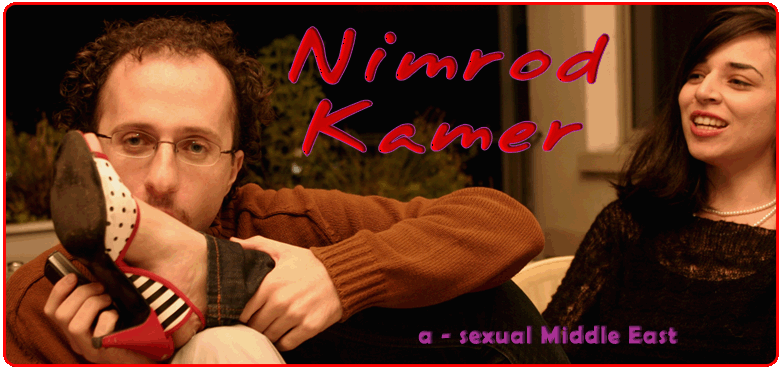article by Nimrod Kamer and Sari Golan \
published in the Egyptian magazine of Nael Eltoukhy \
January 2007 \
Upon visiting Cairo last month with a group of Israeli artists and filmmakers we have reached the conclusion that to officially normalize the cultural relations between Egypt and Israel is not advisable.
We are, however, in favor of a different kind of normalization - normality. Normality is not just a different declension. Normalization sounds like mobilization and hints to a master plan. Normality is more of a sane state of mind, not at all planned. It is simply normal ties being formed between ordinary people rather then bureaucrats. It can even be, in this case, just a municipal connection instead of a government sponsored one. Or, in fact, any kind of relationship - as long as it is not essential and patronizing, or funded by outside factors. My claim is that a state-sponsored embassy exchange and\or co-productions in the film industry and art between Israel and Egypt would surely become such a patronizing link, and both sides should reject it in advance.

Sari Golan, looking upon the inside of the City-Stars Mall,
Heliopolis, Cairo, December 2006
Why does a state-organized and money-based cultural relationship turn out to be so bad and lead to even greater hate between the two nations? For the simple reason that every Israeli producer initiated to do business with Egypt, most of them would be artists chosen by the Israeli foreign office to lead the way, will be obliged to have, overall, a patronizing and superficial approach toward Egypt, and will quite probably act with a sense of saving Egyptian culture by Israeli and\or European money and wisdom, rather than enjoying it. This will undoubtedly lead to an insensitive consumption of Egypt's resources and good hospitality, and to the demand for cheap labor. Israelis "investing" in this kind of peace will prefer seeing the country through its ancient pyramids ruins rather than its constructed buildings and society. They will find the historical side of Egypt culture far more important and extraordinary, dismissing contemporary politics. In other words - a fake atmosphere of peace, a politically correct one.
Better business does not necessarily mean better peace - this is clearly a cliché spoken by the interested ones. We argue that romantic ties, for instance, are much more committing. This essential business argument of developing Egypt might convince some Egyptians, regardless of the fact that Egypt is not at all a developing country (no more than Israel is - that’s for sure) and does not need Israeli money and expertise to make it more western.

People at the Cairo National Stadium, February 2006
An example of this kind of demeaning and exploiting relation between Israel and another "less developed zone" can be found in Romania. There, a group of Israeli business men has taken over the Romanian real estate market, soft drinks and also, soon - the film industry, creating growing resistance in many communities, in what can be described as a new kind of reverse anti-Semitism.
I offer, thus, a different kind of exchange: for example, a specific symbolic connection between the cities Tel Aviv and Cairo, between two streets maybe. Many claim that Tel Aviv is much closer, culturally, to Beirut and to Cairo than to London or New York. I therefore offer normality - first of all between two random people (and artists and so on, but also worker unions and small industry - more symbolically and less binding the better). Just not government - and big businesses. For the first time, as a start of getting to know our neighboring country, we ought to try doing it without any financial push. I even offer it as policy of the Egyptian cultural associations to change nothing in their official boycott policy against Israel, the reasons for its existence are clear, and just encourage specific people to come and meet other relevant people. In the matchmaking process they will avoid doing any empty oriental gestures; in Cairo they shall visit the City Stars mall, the Gezir country club and actual homes - not the pyramids or the main touristic Khan El-Khalili market. Same as in Tel Aviv. To one another they may refer to just by "colleagues" and say "Hi, how are you" not in order to win a co-existence Jewish-Arab peace fund or any other non-realistic western money, that can only do harm.
===========================

* The writers, 25, are living and working in Tel Aviv, Israel. Nimrod Kamer is a business journalist and a filmmaker. His video
"Girls At The Cairo National Stadium" [1] was discussed in 'The Daily Star Egypt'
[2] and other Middle Eastern papers. His colleague Sari Golan is a curator and art teacher.
Photo: GAD restaurant, downtown Cairo
 Brown envelope - a term to describe a brown colored envelope. It is used in and known in government, business and popular culture as a mean to deliver concealed material - bribe money, secret papers or any sort of "under the table" transfer.
Brown envelope - a term to describe a brown colored envelope. It is used in and known in government, business and popular culture as a mean to deliver concealed material - bribe money, secret papers or any sort of "under the table" transfer.





